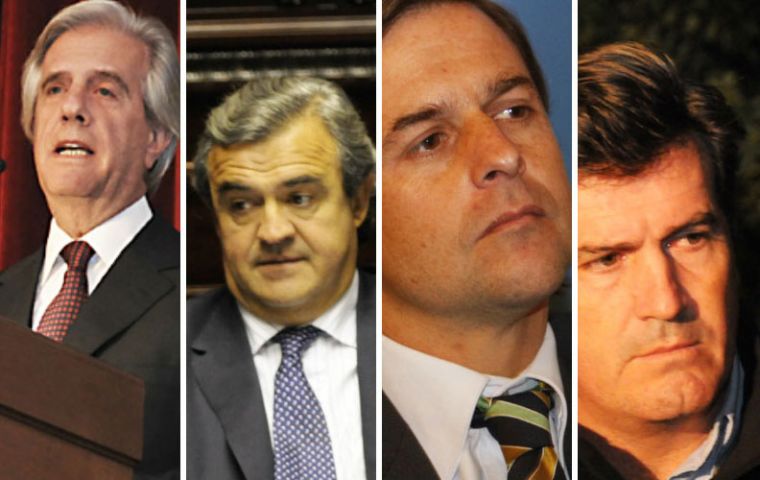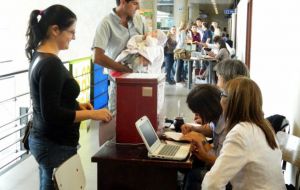MercoPress. South Atlantic News Agency
Uruguay parties chose presidential candidates in next Sunday's primaries
 Former president Vázquez; National party hopefuls Larrañaga and Lacalle Pou; Colorado party leader Pedro Bordaberry
Former president Vázquez; National party hopefuls Larrañaga and Lacalle Pou; Colorado party leader Pedro Bordaberry  Dissident Ms Constanza: ‘when the dinosaurs move out, we can emerge’, and as Mujica said ‘primaries are more boring than dancing with your sister’
Dissident Ms Constanza: ‘when the dinosaurs move out, we can emerge’, and as Mujica said ‘primaries are more boring than dancing with your sister’  Voting in the primaries is not compulsory but the Uruguayan Electoral Court, with the support from armed forces is running the show
Voting in the primaries is not compulsory but the Uruguayan Electoral Court, with the support from armed forces is running the show Uruguay closed on Thursday the primaries election campaign ahead of Sunday's vote when the different parties will be choosing their candidates for the big presidential contest on the last Sunday of October. Whoever is elected in October or in the November run-off will succeed President Jose Mujica on March 2015.
Since voting in the primaries is not mandatory (as in national and municipal elections) and there's not much hype in three of the parties with legislative representation, only an estimated 40% of the 2.6 million registered to vote, is expected to turn out, and if the winter weather is relatively mild, as forecasted by the Met office.
Of the four main parties holding primaries, the contest in the ruling coalition of President Mujica and that of the junior opposition Colorado party, (and of the small Independent party with an only hopeful) should not represent any surprises as to who is the winner, although percentages could be revealing.
In the ruling catch-all-coalition, Broad Front, former president Tabare Vazquez (2005/2010) is comfortably ahead with 80% of support according to the latest opinion polls, while his challenger, Constanza Moreira figures with 18%.
However the fact that in the usually unanimous Broad Front which favors single candidacies, the emergence of Senator Ms Moreira is not only a surprise but her speech is even more challenging (and disappointing) for Vazquez since she questions his age (in his late seventies), his conservative approach in sensitive issues such as abortion and relations with the church, his support of Washington and multilateral organizations such as the IMF and World Bank, but above all the need 'for fresh air' and a renewal of figures in command of the coalition.
So even if Vazquez will receive the necessary support from the coalition voters to become the presidential candidate for October, the percentage of Ms Constanza will be interpreted as a growing manifestation of displeasure with the former president, who for the average hard core Broad Front has become too conservative and moved too far to the right, “he even hosted George Bush”, imagine.
This was so and to such an extent that contrary to Broad Front tradition the two hopefuls refused to hold a joint closing rally. Allegedly Vazquez is quite displeased with many of the arguments of Ms Constanza, and the lady does not want to be pictured next to him, “so after all the votes will also be helping Vazquez”.
In the Colorado party, which has ruled for most of Uruguay's nation existence, but almost disappeared in the 2004 election, Pedro Bordaberry has managed to bring it together and now represents in the range of 15% to 18% of the national vote. Polls have him comfortably ahead in the party with support in the range of 80%, and his challenger Jose Amorin Batlle with his 16% is not a real contender. However the two options respond more to regional alliances at department and county levels, since political parties in Uruguay tend to be wide-ranging and pragmatic when it comes to collecting votes.
But the big dispute is in the main opposition National party which has two strong candidates, Senator Jorge Larrañaga, who lost to Vazquez in 2004, and Luis Lacalle Pou, the son of former president, Luis Alberto Lacalle, (1990/1995).
Opinion polls indicate that while the veteran Larrañaga has managed to keep his stand in the range of 50% support, the young Lacalle in his early forties has steadily climbed from the low twenties to the high forties, which basically means it's an open race. However on their closing rallies both hopefuls were most respectful, exchanged praise and refused to anticipate who their running companion for the presidential ticket would be, thus breaking the established tradition of one/two, president/vice-president.
But the National party primary is crucial since the candidate that emerges, be it Larrañaga or Lacalle Pou, will have the greatest chance to defeat Vazquez in a run off since at national level the Broad Front currently does have the clear majority it enjoyed for years. And it is important that the two National party sides in the primary emerge friendly, with no bitterness as happened in June 2009, which helped President Mujica win in the second round.
In other words with the Broad Front currently having a national vote intention of 43%, the National and Colorado parties together (32% plus 18%) could make a majority in the November run-off, plus the 2% from the Independent party.
What can be said at this stage is that the election results for the Legislative next October won't ensure the winning party a clear undisputed majority in Uruguay's parliament as happened in 2004 and 2009. This time all pollsters coincide, and even the ruling coalition admits, it is difficult to see a clear majority emerging next October both in the Senate and the Lower House. This will force the Executive to work out alliances in the legislative to have bills approved, something which has not happened in the last ten years, be it not for internal frictions inside the ruling coalition that extends from Trotskyites, former guerrillas, radicals and communists to Christina Democrats.
However whatever the Sunday results, on the practical every day side, the end of the two-month campaign comes as a relief for the Uruguayans who have been bombarded with long minutes of radio jingles, television spots and in the streets with massive distribution of candidates leaflets, and loudspeakers. In effect, besides the spaces contracted, under Uruguayan law the different political parties and groupings are entitled to free seconds and minutes in radio and television.
And to this must be added that on this occasion the ruling coalition government fearful of some scandals and mismanagements that have become public, and ongoing conflicts in the schooling system and too powerful unions, it is also involved in a massive campaign outlining all the economic and social achievements of the last ten years. Exhausting. Look out for Monday's chapter.




Top Comments
Disclaimer & comment rulesCommenting for this story is now closed.
If you have a Facebook account, become a fan and comment on our Facebook Page!